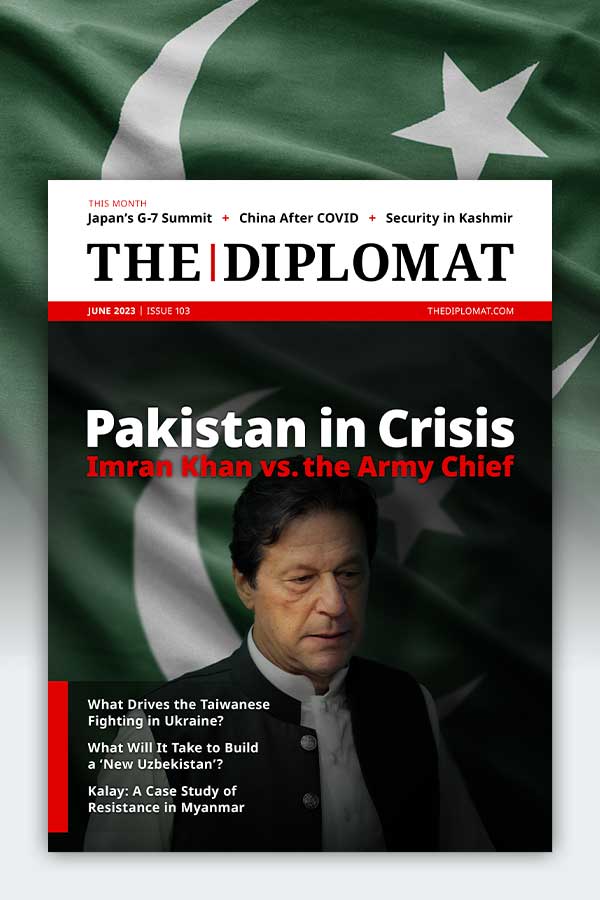| Welcome to the latest issue of Diplomat Brief. This week our top story explores a major setback for Pakistan’s transgender community, and their plans to fight back. We also have an interview with Kham Khan Suan Hausing, head of the department of political science at the University of Hyderabad, India, on the inter-ethnic violence in Manipur. |
| Story of the week | ![[object Object]](https://thediplomat.com/diplomat-brief/2023/vol24/images/feature.jpg) | Society Can Pakistan’s Law on Transgender Rights Survive?What Happened: In 2018, Pakistan’s transgender community – known locally as Khwaja Shira, or “third gender,” people – notched a historic win with the Transgender Persons (Protection of Rights) Act. The law allowed for official recognition of self-perceived gender identity and banned discrimination against transgender persons. But on May 19, Pakistan’s Federal Shariat Court – a constitutional court that examines legislation to ensure compatibility with Islamic law – struck down key sections of the Transgender Persons Act. In Particular, portions relating to self-perceived gender identity were declared to be “un-Islamic.” According to the FSC, gender “must conform to the biological sex of a person” – in other words, only people whose biological sex does not fit into the gender binary can receive the legal protections of the 2018 act. Our Focus: After passage of the Transgender Persons Act, “Khwaja Siras suddenly had this idea that they can work in police protection units, in the Ministry of Human Rights, etc. because there is a quota, we can run for elections. We were no longer asking for charity but a seat at the table,” Mehrub Moiz Awan, a medical doctor and trans rights activist, told The Diplomat. Now the FSC ruling has sparked alarm. “The sections struck down mainly address issues of our identification – if that is removed, then all the other sections and corresponding laws would not be implemented,” transgender rights activist Shahzadi Rai – also a newly elected member of Karachi’s city council – said. “If our identification has become a controversy and has been declared haram (forbidden under Islamic laws) then it’ll definitely further marginalize an already marginalized community.” What Comes Next: The Federal Shariat Court’s ruling will become effective in six months, unless efforts to challenge the verdict in the Supreme Court succeed. “There are serious and convincing arguments against the verdict. If there will be fair and reasonable hearings in the Supreme Court, there is a very fair chance that this ruling by the FSC will be set aside. But of course there is a lot of politics and propaganda surrounding it,” said Asad Jamal, a lawyer who served as a legal representative for trans rights activists during the FSC case. “We will not compromise on the section for gender identification,” vowed Rai, even if “our society and certain religious political parties are living in the Stone Age. Read this story |
| Behind the News | INTERVIEW Kham Khan Suan HausingKham Khan Suan Hausing, head of the department of political science at the University of Hyderabad, India, on how the violence in Manipur fits into a broader pattern of majoritarianism under the BJP: “The conflicts have followed a clearly established pattern of organized orgies of ethnic cleansing and genocidal attacks on the Zo people largely executed by Meitei ragtag mobs, Meitei Leepun and Arambam Tenggol either with the complicity of the state or active involvement of its police.” Read the interview |
| This Week in Asia | Northeast Asia Will US Secretary of State Finally Visit China?U.S. Secretary of State Antony Blinken is reportedly set to visit China this weekend, his first trip to the country since assuming office in early 2021. The visit, if it occurs, would follow a month of steadily increasing engagement, including NSA-level talks and a new Chinese ambassador’s arrival in Washington. Still, neither side has confirmed the trip – a situation is eerily similar to February, when Blinken’s planned trip to China was canceled amid the spy balloon furor without ever having been officially announced. Find out more | South Asia India, Pakistan Brace for Cyclone’s ImpactCyclone Biparjoy is bearing down on the coastlines of India and Pakistan. It’s expected to make landfall on Thursday, hitting Pakistan’s southern Sindh province and India’s western state of Gujarat. Ports have been shuttered and fishing banned in preparation for the storm, with over 100,000 people expected to be evacuated – 80,000 in Pakistan and 20,000 in India. Authorities are hoping that the preparations can limit the damage once the storm hits. Find out more | Southeast Asia Thailand’s Election Body to Investigate Move Forward LeaderThailand’s Election Commission announced this week that it has opened an investigation into Pita Limjaroenrat, the the leader of the progressive Move Forward Party (MFP), threatening his bid to form the country’s next government. Pita led his party to a surprising victory at the election on May 14, clinching 151 out of 500 seats in the House of Representatives. The EC investigation concerns the shares that the MFP leader held in a defunct media company. While there is no timeline for the conclusion of the probe, it could give conservative parliamentarians the pretext they need to oppose Pita’s prime ministerial candidacy when the National Assembly convenes to vote on the matter in early August. Find out more | Central Asia Karimov Era 2.0 for Uzbekistan's MuslimsAfter coming to power following the death of Islam Karimov, Uzbek President Shavkat Mirziyoyev oversaw the release of thousands of prisoners detained on religious charges. But the prisons may be filling up once more. In recent months, there has been a notable increase in the number of Uzbek citizens, many of them young, being jailed for consuming or sharing religious material deemed extremist by the state – but not necessarily obviously so to average citizens. Find out more |
| Visualizing APAC |  | Russia receives over 85% of customs duties taken in by the Eurasian Economic Union – increasingly a bone of contention for the group’s other members. See the full picture |
| Webinar Alert | The Diplomat Asks Where Does Thailand's Politics Go From Here?Thailand's May 14 general election resulted in a surprise victory for the upstart Move Forward Party. Led by 42-year-old businessman Pita Limjaroenrat, the MFP outperformed the favored Pheu Thai Party (PTP), the current political avatar of exiled former Prime Minister Thaksin Shinawatra. Notably, both the MFP and PTP won significantly more support than the main military-backed establishment parties. The MFP, PTP, and six other parties have since joined hands in a progressive coalition, but with the military dominating the Senate, and election results still yet to be certified, it's too early to crown Pita prime minister. What does the election tell us about the state of Thai politics? What are the prospects for true democratic governance, without military interference? And where does the country go from here? Join us on June 19 at 8 p.m. U.S. Eastern time for a live webinar on Thailand’s political future. Featuring Aim Sinpeng is a senior lecturer in Comparative Politics in the Department of Government and International Relations at the University of Sydney. Pavin Chachavalpongpun is an associate professor at the Center for Southeast Asian Studies at Kyoto University. Gregory Raymond is a lecturer in the Coral Bell School of Asia Pacific Affairs researching Southeast Asian politics and foreign relations. Sign up for the webinar |
|  |


![[object Object]](https://thediplomat.com/diplomat-brief/2023/vol24/images/feature.jpg)

